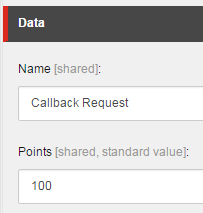In the past simple measures such as the number of hits, sales/leads generated, and simply traffic sources would be used as analytical data to judge the success of a web site. Sitecore which is considered by many as the market leading CMS, is packed full of analytical data inside its Experience Analytics and Experience Profile databases. Furthermore the marketing capabilities allow content authors and marketers to optimize the entire web experience for users (across all channels - including web, mobile, social and even print). One interesting marketing/analytical feature available out of the box in the Sitecore arsenal is: Engagement Value.
Strategic Objectives
A web site should have a primary strategic objective which it is trying to achieve with every user. For example an online store may have a primary strategic objective to make a sale, whereas a service based web site may have a primary strategic objective to generate a qualified lead. This primary strategic object is then what drives and determines the engagement values across the web site. Of course there may be several secondary or tertiary strategic objectives (perhaps related to brand awareness and promotion of key products/services), however these are not what the site is optimized based on.
For a strategic objective of generating a qualified lead, a goal around completing a call-back form would be given a high value (100 points for example) as this shows the user is highly interested in that service, where as a goal around downloading a brochure file would have less of a value because while it shows engagement and interest, it's not the highest valued action a user can complete (a person just browsing may download a brochure, but an interested party is more likely to fill in a form).
If you set high values on less than ideal goals (such as simply downloading a brochure, versus completing the call-back form) you are then likely to begin optimizing the site for downloading the brochure rather than completing the call-back form, this is not ideal because you want to optimize to the highest point actions. Each goal or action that aids in meeting the strategic objective is worth some engagement value, it then becomes a balancing act to apply the correcting value to each so that you optimize for the correct goals, and also not missing any items out which can aid in meeting the strategic objective.
An example of some engagement values for a service based organisation with a strategic objective of generating a qualified lead could look like:
Value Goal
100 Complete the call-back form
60 Signup for a demonstration
30 Get an online quote
10 Signup for a mailing list
5 Download a case study brochure
Assigning Engagement Value
When you create a goal in Sitecore, there is a field (defaults to 0) which allows you to specify the points for that goal. It's these points which are the Engagement Values.
Viewing the results of Engagement Value - The Measure of Success
Throughout the Experience Analytics section in Sitecore, the average values are shown in the data tables.
The example above shows the top exit pages for the web site, and the value is visible. By looking at the top exit pages, and the corresponding value, you are able to see where low value visitors are exiting the site and can make optimisations based on that. This may mean refactoring content on these pages or even using methods such as related content widgets to keep users on the site.
In the example above, the value is shown for the marketing campaigns. In this case the email campaign had better results than Facebook (based on both value and time spent on site). These campaigns would have a monetary cost, so figuring out which ones provide the best value for money is important. Marketing budgets can be especially low in smaller organisations, so getting the best value for that money is ideal and once the results are proven, that budget is likely to increase.
These are just a couple examples of the usefulness of engagement value in Sitecore. When it comes to search keywords (paid and unpaid), A/B + Multivariate testing and even personalisation you can use engagement value as a measure of their success and further optimize the site and it’s campaigns.
The real benefit here is that you are not only optimizing on a single goal (such as a sale or call-back form submission), but a whole set of goals that all contribute to the strategic objective of the web site. Sure, the main goal (which is likely making the sale) will be worth the most engagement value, however the other goals are still valuable (albeit not so much). With Sitecore Engagement Value you optimize for the full picture and all items that contribute to the strategic goal, ultimately this will lead to more success.


